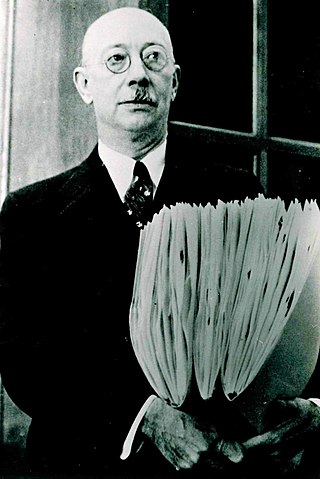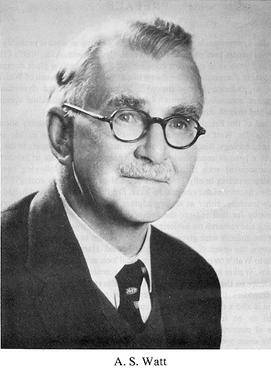Related Research Articles

Sir Arthur George Tansley FLS, FRS was an English botanist and a pioneer in the science of ecology.

Charles Sutherland Elton was an English zoologist and animal ecologist. He is associated with the development of population and community ecology, including studies of invasive organisms.
Ecology is a new science and considered as an important branch of biological science, having only become prominent during the second half of the 20th century. Ecological thought is derivative of established currents in philosophy, particularly from ethics and politics.

Ecological restoration, or ecosystem restoration, is the process of assisting the recovery of an ecosystem that has been degraded, damaged, or destroyed. It is distinct from conservation in that it attempts to retroactively repair already damaged ecosystems rather than take preventative measures. Ecological restoration can reverse biodiversity loss, combat climate change, and support local economies.
Michael L. Rosenzweig is a professor of ecology and evolutionary biology at the University of Arizona. He developed and popularized the concept of Reconciliation ecology. He received his Ph.D in zoology at the University of Pennsylvania in 1966 and then held a number of academic positions around the United States.
Sir Harry Godwin, FRS was a prominent English botanist and ecologist of the 20th century. He is considered to be an influential peatland scientist, who coined the phrase "peat archives" in 1981. He had a long association with Clare College, Cambridge.

Henry Allan Gleason (1882–1975) was an American ecologist, botanist, and taxonomist. He was known for his endorsement of the individualistic or open community concept of ecological succession, and his opposition to Frederic Clements's concept of the climax state of an ecosystem. His ideas were largely dismissed during his working life, leading him to move into plant taxonomy, but found favour late in the twentieth century.
Charles Henry Gimingham was a British botanist at the University of Aberdeen, patron of the Institute of Ecology and Environmental Management, former president of the British Ecological Society, and one of the leading researchers of heathlands and heathers.
John Philip Grime was an ecologist and emeritus professor at the University of Sheffield. He is best known for the universal adaptive strategy theory (UAST) and the twin filter model of community assembly with Simon Pierce, eco-evolutionary dynamics, the unimodal relationship between species richness and site productivity, the intermediate disturbance hypothesis, and DST classification.

Tikhon Alexandrovich Rabotnov was a Russian plant ecologist. He was professor and head of the Department of Geobotany at Moscow State University until 1981. He was a father figure to generations of Russian plant ecologists. He conducted ground breaking studies in the regeneration of natural plant communities – studies which remained largely overlooked in the West.

Alexander Stuart Watt FRS(21 June 1892 – 2 March 1985) was a Scottish botanist and plant ecologist.
Samuel Joseph McNaughton was an American ecologist and professor at Syracuse University. He received his Ph.D. at University of Texas-Austin in 1964, and was tenured to Syracuse University in 1966.
Murray Fife Buell was an American ecologist and palynologist.
Professor Fakhri Al-Bazzaz was an Iraqi-American plant ecologist specializing in the study of plant community ecological succession. A professor and prolific author, he was ranked amongst the top ten "Most Cited Scientists in Environment/Ecology, 1992–2002".
William A. Reiners is an American ecologist. He was born in Chicago, Illinois. Reiners attended Knox College and Rutgers University. At the latter, he was a student of Murray F. Buell.
Dale Hadley Vitt is an American bryologist and peatland ecologist, recognized as a leading expert on peatlands. From 1989 to 1991 he was the president of the American Bryological and Lichenological Society.

Stephen Denis Garrett was a British plant pathologist and mycologist who did pioneering work on soil-borne pathogens, root pathology and soil ecology. He was the first to apply ecological concepts to interactions in the soil. Much of his research used as a model system the fungus Gaeumannomyces graminis, which causes the important cereal disease take-all. He also studied Armillaria root rot of trees, among other plant diseases.
Myron P. Zalucki is an Australian professor emeritus of entomology at the University of Queensland (UQ). Zalucki is a Fellow of the Entomological Society of America, a member and secretary of the Council of the International Congresses of Entomology, and a co-editor of the Annual Review of Entomology.
Robin Lee Chazdon is an American tropical ecologist. She is a professor emeritus of ecology and evolutionary biology in the College of Liberal Arts and Sciences at the University of Connecticut.

Steward T. A. Pickett is an American plant ecologist and a distinguished senior scientist at the Cary Institute of Ecosystem Studies. Pickett is the recipient of the 2021 BBVA Foundation Frontiers of Knowledge Award in Ecology and Conservation Biology for "incorporating the spatial dimension into ecosystem research, in the sense of landscape and its multiple scales, and bringing it to bear in the management of coupled human-natural systems", as well the Ecologist Society of America's 2021 Eminent Ecologist Award.
References
- 1 2 "Grubb, Prof. Peter John, (born 9 Aug. 1935), Professor of Investigative Plant Ecology, Cambridge University, 2000–01, now Emeritus; Fellow, Magdalene College, Cambridge, 1960–2002, now Emeritus (President, 1991–96)". WHO'S WHO & WHO WAS WHO. 2007. doi:10.1093/ww/9780199540884.013.U18354. ISBN 978-0-19-954088-4 . Retrieved 9 August 2021.
- 1 2 Grubb, P.J. (2003). "On becoming a plant ecologist". Seed Science Research. 13: 3–15. doi:10.1079/SSR2002120. S2CID 86848359.
- ↑ Grubb, P.J. (1977). "The maintenance of species-richness in plant communities: the importance of the regeneration niche". Biological Reviews. 52: 107–145. doi:10.1111/j.1469-185x.1977.tb01347.x. S2CID 86116580.